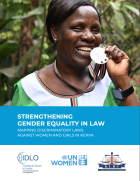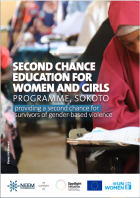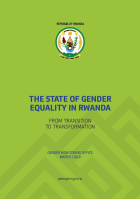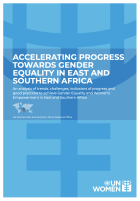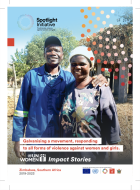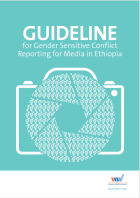1 - 18 of 18 Results
Date:
This brief examines Tanzania’s promises and efforts to stop these destructive activities, assesses how common they are across the country, and reveals the crucial role that societal norms and other underlying causes play.
Date:
Under the leadership of the Ministry of Gender, Child, and Social Welfare, in collaboration with the Ministry of Peace Building, and with support from UN Women and international funding, the Women’s Charter empowers women and girls to engage with the Reconstituted National Constitutional Review Commission (R-NCRC). Launched on May 29, 2024, in Juba, the Charter addresses twelve critical themes, advocating for comprehensive legal, policy, and programmatic interventions in the Permanent Constitution-making process.
Date:
UN Women and International Development Law Organization (IDLO), in partnership with the Kenya Law Reform Commission. Researcher/writer: Dr. Consolata Ngondi; Ms. Petronella Mukaindo
Date:
Under the Joint UN-EU Spotlight initiative, the Second Chance Education center for Women and Girls, Sokoto, was established to ensure GBV survivors in Sokoto get a second chance at economic empowerment and basic education. This document highlights some of the human impact stories made by the Joint UN-EU Spotlight initiative in Sokoto
Date:
This Report presents the Africa Shared Research Agenda (ASRA) for ending gender-based violence (GBV), which was developed though a collaboration between UN Women Africa and the Sexual Violence Research Initiative. The ASRA is a set of research priorities for the field, developed through a participatory and consultative process and aims to inform investments in research over the coming 5-10 years for ending GBV in Central, East, Southern and West Africa.
Date:
This publication highlights the progress and prevailing gender gaps in Rwanda so far as far as Gender Equality and Women's Empowerment is concerned. It also gives insights into the state of gender equality in the National Strategy for Transformation (NST1) pillars.
Date:
The Report highlights the imperative and urgent need to have men, along with women, become gender equality activists and work towards violence-free, inclusive societies. An important reflection on masculinity sheds light on how toxic masculinity models not only harm women and girls, but the majority of men and boys too. In this regard, gender equality really matters for both men and women, and requires both to join their efforts to realize it.
Date:
Galvanizing a movement, responding to all violence and discrimination against women and girls in Zimbabwe. After four years of programming in Zimbabwe, the EU-funded Spotlight Initiative has made milestones in ending all forms of violence and discrimination against women and girls. This story booklet captures voices of the programme beneficiaries and various stakeholders in all five programme districts across Zimbabwe.
Date:
This quarterly newsletter profiles UN Women Uganda activities and highlights voices of beneficiaries. The Q3 Newsletter covers the period of July to September 2022.
Enjoy the read!
Date:
This publication describes the UN Women Rwanda Office's effort in dealing with Gender-Based Violence (GBV) victims using different approaches in both GBV prevention and response. It also provides success stories from different beneficiaries in relation to legal assistance which showed that in most cases it requires strong courage from the victims to bring the perpetrators to justice especially in the context of negative cultural beliefs, women's economic dependence, fear of discrimination and stigmatization among other challenges. The document also highlights the role of mobile legal clinic in increasing the proximity of legal services to the community including awareness-raising and legal literacy.
Date:
It is a reality that our region carries the highest prevalence of child marriage and female genital mutilation in the world, impacting millions of our girls. These harmful traditional practices have devastating impact including loss of life, risk of disease such as fistula, loss of education and life opportunities, trauma and other psycho-social impacts resulting in deepening poverty and perpetuating a cycle of abuse. This calls on us as traditional and religious leaders to urgently assume our role as protectors of our children. The COVID-19 pandemic has further exacerbated the prevalence of genderbased violence in our countries and communities.
Date:
The UN Women WCARO annual report aims to share information about the regional office's activities on women empowerment and gender equality in 2020. The said year has been a particularly difficult year around the world with the COVID-19 pandemic. In West and Central Africa (WCA), women and girls were particularly vulnerable to the crisis. To counter these burdens and build medium and long- term recovery measures, the UN Women WCA Regional Office successfully provided multi-faceted assistance...
Date:
This publication highlights findings from the Zanzibar SDGs Gender Indicators Study in the form of infographics. The infographics showcase findings from each of the sectors covered in the report namely: Poverty and Hunger, Health, Decent Work, Quality Education, Gender Equality, Key Messages and the COVID-19 Context, and Recommendations.
Date:
Gender Sensitive Conflict Reporting is not an area well developed in Ethiopia. Conflict reporting has either been gender blind at best, or at worst, perpetuated stereotypes, and harmful narratives. UN Women in collaboration with Ethiopian Media Authority has developed a guideline that will be useful as a reference for journalists working in different media. After the development of the guideline, journalists have been trained and the guideline has been disseminated. It is believed the guideline will help journalists to reflect an accurate portrayal of gender in their reporting. It is also designed as a practical and go-to reference guideline.
Date:
The policy paper assesses the state of Gender Based Violence (GBV) in Africa in the context of the COVID-19 pandemic. Informed by evidence from the five African Union (AU) regions, it outlines some of the initiatives implemented in AU Member States. The paper also proposes recommendations towards multi-sectoral response and recovery efforts that address GBV as well as the related needs of women and girls in Africa.
Date:
The crisis caused by the COVID-19 pandemic must be viewed with a gendered lens to protect women and girls and address the increase in VAWG during this pandemic. In Ethiopia, this can be accomplished with accelerated and concerted efforts of the Government and the United Nations, in partnership with other development agencies and national civil society organizations. This Policy brief presents overview of the increased in GBV in Ethiopia and give recommendations on measures to be taken to address the issue.
Date:
This Guideline for Gender Responsive Media published in two languages (Amharic and English) aims to inform and guide media houses, media practitioners, journalists, editors, and anyone in the media and communication sector about ethical reporting of issues related with gender and actions to take to create a gender sensitive media environment both within the media houses as well as in all the contents produced by the media houses
Date:
UN Women in partnership with the Ethiopian Broadcasting Authority (EBA) held a capacity building training on gender sensitive reporting and news coverage to print and broadcasting media practitioners from various regions of the country. This training aimed to enhance the participants’ gender knowledge and to equip them with necessary skills for promoting gender equality and the empowerment of women.



